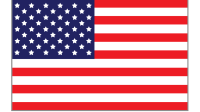
Do American Flags Have to Be Made in America: A Comprehensive Guide
The American flag, a symbol of national pride and unity, holds a significant place in American culture and history. However, the question of whether American flags must be made in the United States has sparked debates and legal challenges over the years. This article delves into the complex legal landscape surrounding this issue, examining the relevant laws, court rulings, and ongoing discussions.
The "All-American Flag Act"
In 1998, Congress passed the "All-American Flag Act," which states that "any American flag to be displayed on a flagpole on any building owned by the United States government, or any building owned by any department, agency, or instrumentality of the United States government, shall be made in the United States." This law specifically applies to flags flown on government buildings, but it has also influenced public opinion and industry practices.
The "Berry Amendment"
The "Berry Amendment" is a provision included in the Defense Appropriations Act of 1941. It requires that "any item of individual equipment" procured for the U.S. Department of Defense be manufactured in the United States. The amendment was originally intended to support American manufacturing during wartime, and it has since been interpreted to include military flags.
Court Rulings and Interpretations
Despite these laws, the question of whether American flags must be made in America has been subject to court challenges. In 2015, the U.S. Supreme Court ruled in a case involving sewn-in labels (Korea v. United States) that the Berry Amendment did not require such labels to be made in the United States. This ruling suggested that the "made in America" requirement only applies to the actual materials and components of the product.
However, in a subsequent case (Hawaii v. Trump), the U.S. Court of Appeals for the Ninth Circuit ruled in 2019 that the All-American Flag Act applies to the entire process of making American flags, including sewing and assembly. This ruling contradicted the Supreme Court’s interpretation of the Berry Amendment, creating a legal conflict.
Ongoing Discussions and Impact on the Industry
The conflicting court rulings have fueled ongoing discussions about the interpretation and enforcement of the laws governing the manufacturing of American flags. Some argue that flags should be made domestically to support American manufacturing and ensure quality. Others contend that price and availability should be primary considerations, allowing for flags to be made in different countries where labor costs may be lower.
The American flag industry has been significantly impacted by these laws and court rulings. Many American flag manufacturers have shifted production to other countries, such as China, where labor costs are lower. However, there are still a number of American companies that produce flags domestically, often at a higher cost.
Enforcement and Penalties
Enforcement of the laws governing the manufacturing of American flags is generally handled by the U.S. Customs and Border Protection (CBP). CBP may inspect imported flags to ensure compliance with the Berry Amendment and All-American Flag Act. Violations of these laws can result in penalties, including fines and seizure of non-compliant flags.
Exceptions and Considerations
There are certain exceptions to the requirement that American flags be made in the United States. These include:
- Flags made for personal use: Individuals may legally purchase and display American flags that were not made in the United States.
- Flags used by religious organizations: American flags used for religious purposes, such as in churches or synagogues, are exempt from the manufacturing requirements.
- Flags flown in foreign countries: American flags flown at U.S. embassies and other diplomatic facilities abroad are not subject to these laws.
Frequently Asked Questions (FAQs)
Q: Must all American flags be made in the United States?
A: No, only American flags flown on government buildings and military flags must be made in the United States by law. Individuals may legally purchase and display flags made in other countries.
Q: What is the All-American Flag Act?
A: The All-American Flag Act requires that all American flags flown on government buildings in the United States be made in the United States.
Q: What is the Berry Amendment?
A: The Berry Amendment requires that any item of individual equipment procured for the U.S. Department of Defense be manufactured in the United States. This has been interpreted to include military flags.
Q: Can I be penalized for flying a flag not made in the United States?
A: No, individuals are not typically penalized for flying flags not made in the United States. However, flags flown on government buildings must meet the legal requirements.
Q: Are there any exceptions to the manufacturing requirements?
A: Yes, there are exceptions for flags made for personal use, religious organizations, and flags flown in foreign countries.
Conclusion
The issue of whether American flags must be made in America has proven to be complex and multifaceted, with both legal and practical implications. The All-American Flag Act and the Berry Amendment impose certain manufacturing requirements on government and military flags, but these requirements do not apply to flags flown by individuals or used for other purposes. Court rulings and ongoing discussions have further shaped the interpretation and enforcement of these laws. Ultimately, the decision of whether to fly an American flag made in the United States is a matter of individual conscience and patriotism.
References
- All-American Flag Act (1998)
- Berry Amendment (1941)
- Korea v. United States (2015)
- Hawaii v. Trump (2019)





